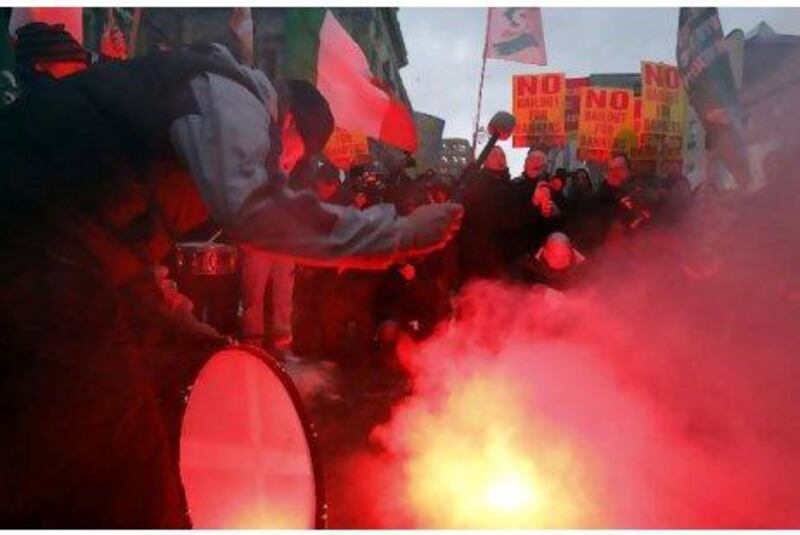DUBLIN // The euro gained in value yesterday as fears receded that Prime Minister Brian Cowen would not be able to muster the votes to pass a brutal €6 billion (Dh29.44bn) package of spending cuts and tax increases.
It was widely feared that failure to pass the Irish budget yesterday would torpedo the European Central Bank's efforts to quarantine the Irish sovereign debt crisis - caused by the collapse of a massive property bubble in 2008 - from other indebted Euro-zone governments struggling to finance their public spending. Those governments include Portugal, Italy, Greece and Spain.
The Irish must trim another €9bn from its deficit - now running at 32 per cent of GDP for 2010 - over the next three years under the terms of an €85bn loan approved by the European Union and International Monetary fund last month.
Last night, however, it looked likely that Mr Cowen and his finance minister Brian Lenihan would be able to push the bill through the Dail - the Irish Parliament - after a late round of horse-trading with two independent parliamentarians.
There were some minor scuffles outside the parliament in Dublin as police sought to control demonstrators. One man was arrested after he parked a cherry-picker outside and used it to blast the building with "Poker Face" by Lady Gaga, and the theme music from "The Good, the Bad and the Ugly".
In general, the budget contained few surprises, its contents having been signalled by the four-year austerity programme announced by the government last week under the watchful eyes of the EU-IMF team that arrived in Dublin on November 17.
The burden of the adjustment will fall most heavily on low earners, families and the unemployed, who will suffer most from a €1 reduction in the hourly minimum wage, four per cent social welfare cuts and the adjustment of tax bands and credits to take in very low earners and push middle-income earners on to the highest rate. University registration fees also will increase by 25 per cent to €2,000.
The tax rate for top earners will not increase, but many will for the first time be required to pay national insurance contributions. Ireland's 12.5 per cent corporate tax rate - regarded as piratically low by other European states who see their corporations re-flag in Dublin - is to remain unchanged, despite foreign pressure.
Excise on fuel is to increase, but a controversial €10 travel tax is to be reduced to €3 per trip in a bid to revitalize the flagging tourist sector.
The number of public employees is to be cut by more than 24,000 while pay for civil servants and employees of publicly owned companies will be capped at €250,000.
Among those to suffer will be Mr Cowen and his ministers, who will lose €14,000 and €10,000 respectively.
The passage of the budget is expected to be the last significant political act by this coalition, whose junior partner - the Green Party - has already said it wants new elections early next year.
Delivering his budget speech, Mr Lenihan acknowledged that his government had made mistakes in its handling of the economy, but said he did not believe any other Irish party would have done much differently.
"The budget cuts for the next four years are large," he said, "but if we postpone them then more wrenching adjustments will be needed at a later date."
The budget was strongly condemned in the Dail by the two parties most likely to come together to form a new government next year - the centre-right Fine Gael and centre-left Labour Party - which both said that the massive cuts would cripple prospects for growth.
Fine Gael shadow finance minister Michael Noonan said that the government was "soft on the rich and hard on the poor."
He said the budget was the act of a "puppet government" acting under orders from the EU and IMF, and that there was "not a single progressive idea to support investment and get our country growing again."
Labour party leader Eamon Gilmore said those on middle and low incomes must bear the brunt.






